Member Update: December 2019
Hartl, Lee win Breakthrough Prize
Two of the five winners of the 2020 Breakthrough Prize in Life Sciences are members of the American Society for Biochemistry and Molecular Biology.
 F. Ulrich HartlF. Ulrich Hartl, managing director of the Max Planck Institute of Biochemistry, and Virginia Man-Yee Lee, a professor in Alzheimer’s research at the University of Pennsylvania, are among the recipients of the $3 million award, one of three awarded annually by the Breakthrough Prize Foundation and known collectively as the “Oscars of Science.” The foundation also selected recipients in physics and mathematics.
F. Ulrich HartlF. Ulrich Hartl, managing director of the Max Planck Institute of Biochemistry, and Virginia Man-Yee Lee, a professor in Alzheimer’s research at the University of Pennsylvania, are among the recipients of the $3 million award, one of three awarded annually by the Breakthrough Prize Foundation and known collectively as the “Oscars of Science.” The foundation also selected recipients in physics and mathematics.
Hartl shares the honor with Arthur L. Horwich of the Yale School of Medicine and the Howard Hughes Medical Institute, for discovering functions of molecular chaperones in mediating protein folding and preventing protein aggregation, which can be a precursor to cancer and neurodegenerative diseases.
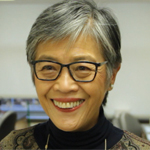 Virginia Man-Yee LeeLee is a John H. Ware endowed professor in Alzheimer’s research at the Perelman School of Medicine, director of the Center for Neurodegenerative Disease Research and co-director of the Marian S. Ware Center for Alzheimer’s Drug Discovery Program. She is honored for discovering TDP43 protein aggregates in frontotemporal dementia and amyotrophic lateral sclerosis and for showing that different forms of alpha-synuclein in different cell types underlie Parkinson’s disease and multiple system atrophy.
Virginia Man-Yee LeeLee is a John H. Ware endowed professor in Alzheimer’s research at the Perelman School of Medicine, director of the Center for Neurodegenerative Disease Research and co-director of the Marian S. Ware Center for Alzheimer’s Drug Discovery Program. She is honored for discovering TDP43 protein aggregates in frontotemporal dementia and amyotrophic lateral sclerosis and for showing that different forms of alpha-synuclein in different cell types underlie Parkinson’s disease and multiple system atrophy.
Jeffrey M. Friedman and David Julius also received the life sciences prize. The recipients were honored at an awards ceremony in November at the NASA Ames Research Center in California.
Cell biology society names fellows
 David Asai
David Asai
 Mary Dasso
Mary Dasso
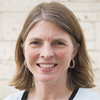 Erin Dolan
Erin Dolan
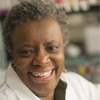 Vassie Ware
Vassie Ware
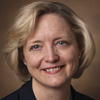 Susan Wente
Susan Wente
Five members of the American Society for Biochemistry and Molecular Biology are among the 16 fellows elected to the American Society for Cell Biology in 2019. The fellows, who are selected by their peers, are recognized not only for their contributions to research involving cell biology and to its community of scientists but also for their commitment to the mission of the ASCB.
Congratulations to these ASBMB members:
David Asai, senior director for science education, Howard Hughes Medical Institute, Chevy Chase, Maryland.
Mary Dasso, senior investigator in the Section on Cell Cycle Regulation, National Institutes of Health, Bethesda, Maryland.
Erin Dolan, professor of biochemistry and molecular biology and Georgia Athletic Association professor of innovative science education, University of Georgia, Athens.
Vassie Ware, professor of biological sciences and co-director, HHMI biosciences program and distance education program, Lehigh University, Bethlehem, Pennsylvania.
Susan Wente, professor of cell and developmental biology, provost, interim provost and vice chancellor for academic affairs, Vanderbilt University, Nashville, Tennessee.
The 16 new fellows will be recognized at the ASCB/European Molecular Biology Organization meeting to be held in Washington, D.C., this month.
National Academy of Medicine elects new members
Five members of the American Society for Biochemistry and Molecular Biology are among the 90 new regular members and 10 new international members elected to the National Academy of Medicine.
The newly elected members include:
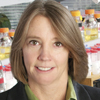 Beverly L. Davidson, professor of pathology and laboratory medicine, Perelman School of Medicine, University of Pennsylvania, and director, Raymond G. Perelman Center for Cellular & Molecular Therapy, Children’s Hospital of Philadelphia.
Beverly L. Davidson, professor of pathology and laboratory medicine, Perelman School of Medicine, University of Pennsylvania, and director, Raymond G. Perelman Center for Cellular & Molecular Therapy, Children’s Hospital of Philadelphia.
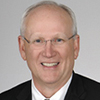 Raymond N. DuBois Jr., dean of the college of medicine and professor of biochemistry and medicine, Medical University of South Carolina, Charleston.
Raymond N. DuBois Jr., dean of the college of medicine and professor of biochemistry and medicine, Medical University of South Carolina, Charleston.
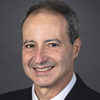 J. Silvio Gutkind, professor of pharmacology and associate director of basic science, Moores Cancer Center, University of California, San Diego.
J. Silvio Gutkind, professor of pharmacology and associate director of basic science, Moores Cancer Center, University of California, San Diego.
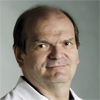 Krzysztof Palczewski, director of the Center for Translational Vision Research, Irving H. Leopold chair in ophthalmology and a professor of physiology and biophysics at the University of California, Irvine School of Medicine.
Krzysztof Palczewski, director of the Center for Translational Vision Research, Irving H. Leopold chair in ophthalmology and a professor of physiology and biophysics at the University of California, Irvine School of Medicine.
 Anil K. Rustgi, professor of medicine and director, Herbert Irving Comprehensive Cancer Center and associate dean of oncology, department of medicine, Vagelos College of Physicians and Surgeons, Columbia University, New York City.
Anil K. Rustgi, professor of medicine and director, Herbert Irving Comprehensive Cancer Center and associate dean of oncology, department of medicine, Vagelos College of Physicians and Surgeons, Columbia University, New York City.
The newly elected members bring the NAM’s total membership to more than 2,200 and the number of international members to approximately 180.
Velasquez, Torres land Gilliam fellowship
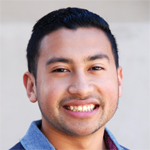 Erick Velasquez
Erick Velasquez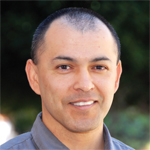 Jorge Torres
Jorge Torres
Erick Velasquez, a Ph.D. student in the biochemistry, molecular and structural biology program at the University of California, Los Angeles, and Jorge Torres, a a professor in the department of chemistry and biochemistry at UCLA are among this year’s 44 pairs of Gilliam fellows, selected by the Howard Hughes Medical Institute.
Gilliam fellowships for advanced study are unique in supporting advisor-student pairs rather than professors or trainees in isolation. Designed to foster diversity and inclusion in science and train future scientific leaders, the awards support fellows in their later years of graduate school and provide training for their faculty mentors.
Under Torres’ supervision, Velasquez plans to apply machine learning to proteomics data sets to understand protein-protein interactions in mitosis.
Torres studies proteins that direct the assembly and function of the mitotic spindle and uses multidisciplinary approaches to develop new anti-cancer drugs. He received the American Society for Biochemistry and Molecular Biology’s 2019 Ruth Kirschstein Diversity in Science Award.
Fleming recognized for diversity work
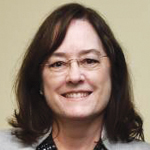 Karen Fleming
Karen Fleming
Karen Fleming, a professor of biophysics at Johns Hopkins University, received the university’s Provost’s Prize for Faculty Excellence in Diversity in May.
The $50,000 prize recognizes faculty efforts to promote gender and racial diversity. In Fleming’s case, that advocacy work includes starting a journal club for gender equity, teaching fellow Hopkins professors about best practices for inclusive pedagogy and holding equity workshops at scientific society meetings.
“We all need to plug the leaks in the STEM pipeline through our actions and words each and every day,” Fleming said in her remarks on receiving the award.
Fleming, whose research focuses on membrane protein folding and the involvement of chaperones in that process, serves as an associate editor of the Journal of Biological Chemistry.
Brown University honors Gordon
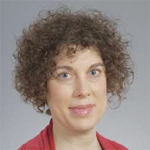 Sharona Gordon
Sharona Gordon
Sharona Gordon, a professor of physiology and biophysics at the University of Washington in Seattle, was awarded Brown University’s 2019 Horace Mann Medal.
The prize, named after a politician and education reformer who attended Brown in the early 19th century, recognizes significant contributions of Brown graduate alumni to their fields and was conferred at the university’s commencement ceremony in May.
Gordon, whose research focuses on the physiology of ion channels in the TRP family, serves as the editor-in-chief of the Journal of General Physiology. Last year she founded Below the Waterline, a grassroots organization aimed at improving the culture of science by addressing gender harassment, and she published a study on the development of scientific identity among postdocs.
In their announcement of the prize, the award committee noted Gordon’s commitment to the scientific community along with her own scientific achievements.
Biophysical Society announces honors
American Society for Biochemistry and Molecular Biology members G. Marius Clore, Dan Herschlag and Alexandra C. Newton are among the recipients of the 2020 Biophysical Society awards. ASBMB members Cynthia Wolberger and Hao Wu have been named 2020 BPS fellows.
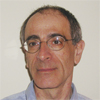 G. Marius Clore, a National Institutes of Health distinguished investigator and chief of the Protein Nuclear Magnetic Resonance Section of the National Institute of Diabetes and Digestive and Kidney Diseases, will receive the BPS Innovation Award in recognition of his contributions to the development of nuclear magnetic resonance imaging for determining 3D structures of macromolecules in solution and his work on the development of paramagnetic and relaxation-based NMR experiments to characterize rare, transient and previously invisible states of macromolecules.
G. Marius Clore, a National Institutes of Health distinguished investigator and chief of the Protein Nuclear Magnetic Resonance Section of the National Institute of Diabetes and Digestive and Kidney Diseases, will receive the BPS Innovation Award in recognition of his contributions to the development of nuclear magnetic resonance imaging for determining 3D structures of macromolecules in solution and his work on the development of paramagnetic and relaxation-based NMR experiments to characterize rare, transient and previously invisible states of macromolecules.
 Dan Herschlag, a professor of biochemistry at Stanford University, will receive the society’s Founders Award for his fundamental contributions to RNA folding and enzymology. “The Founders Award allows us to call attention to outstanding achievements in biophysics that are now accepted and used by others, whether that acceptance was immediate or over a period of years,” BPS President Dave Piston stated. “Dan’s work on RNA folding and enzymology has had a ripple effect on the field, leaving a lasting impact on the entire breadth of molecular biophysics.”
Dan Herschlag, a professor of biochemistry at Stanford University, will receive the society’s Founders Award for his fundamental contributions to RNA folding and enzymology. “The Founders Award allows us to call attention to outstanding achievements in biophysics that are now accepted and used by others, whether that acceptance was immediate or over a period of years,” BPS President Dave Piston stated. “Dan’s work on RNA folding and enzymology has had a ripple effect on the field, leaving a lasting impact on the entire breadth of molecular biophysics.”
 Alexandra C. Newton, a professor in the department of pharmacology at the University of California, San Diego, will received the BPS Award in the Biophysics of Health and Disease in recognition of her paradigm-shifting discoveries that showed how disease mutations that inhibit protein kinase C activity cause cancer while those that activate PKC are drivers of neurodegenerative diseases.
Alexandra C. Newton, a professor in the department of pharmacology at the University of California, San Diego, will received the BPS Award in the Biophysics of Health and Disease in recognition of her paradigm-shifting discoveries that showed how disease mutations that inhibit protein kinase C activity cause cancer while those that activate PKC are drivers of neurodegenerative diseases.
 Cynthia Wolberger is a professor of biophysics and biophysical chemistry at the Johns Hopkins University School of Medicine. Her research in ubiquitin signaling and regulation of transcription has transformed understanding of molecular mechanisms underlying genes regulation through elegant structural studies.
Cynthia Wolberger is a professor of biophysics and biophysical chemistry at the Johns Hopkins University School of Medicine. Her research in ubiquitin signaling and regulation of transcription has transformed understanding of molecular mechanisms underlying genes regulation through elegant structural studies.
 Hao Wu is the Asa and Patricia Springer professor in the department of biological chemistry and molecular pharmacology at Harvard Medical School. Her use of structural immunology has revised the view of intracellular signaling and cellular organization through discovering supramolecular signalosomes formed by innate immune signaling proteins, mechanisms that govern cooperative assembly, and proximity-driven enzyme activation.
Hao Wu is the Asa and Patricia Springer professor in the department of biological chemistry and molecular pharmacology at Harvard Medical School. Her use of structural immunology has revised the view of intracellular signaling and cellular organization through discovering supramolecular signalosomes formed by innate immune signaling proteins, mechanisms that govern cooperative assembly, and proximity-driven enzyme activation.
Boehning moves to Rowan University
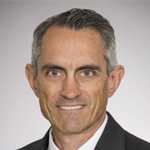 Darren Boehning
Darren Boehning
Darren Boehning, until recently a professor of biochemistry and molecular biology at the University of Texas Health Science Center at Houston, has joined the Cooper Medical School of Rowan University in Camden, New Jersey. He will serve as head of the school’s department of biomedical sciences and assistant dean for research.
Boehning’s research focuses on apoptosis, investigating how the inositol triphosphate receptor calcium channel contributes to cell death. This receptor is not only dysregulated in certain cancers, where it contributes to resistance to apoptosis, but also in traumatic injury, which increases its activity and can contribute to stress-induced diabetes.
While leading that research, Boehning also held several leadership roles at UTHealth, most recently directing two graduate programs. His accolades include awards for teaching excellence and for being an outstanding faculty member.
Biophysical Society elects Moores to council
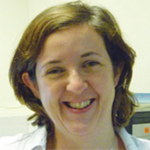 Carolyn A. Moores
Carolyn A. Moores
Carolyn A. Moores of Birkbeck College, part of the University of London, has been elected to the governing council of the Biophysical Society. She will begin a three-year term in February 2020.
A professor of structural biology whose lab studies microtubule organization and dynamics, Moores runs the biological sciences department at Birkbeck and recently was appointed interim dean at the college. She also is the academic head of the electron microscopy and image processing lab.
With more than 9,000 members around the world, the Biophysical Society develops and shares knowledge in biophysics. Its members elected a new president-elect and four council members, including Moores, in August.
In memoriam: John Oates
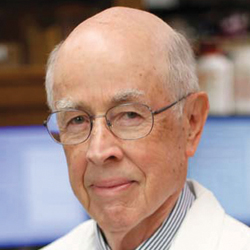 John Oates, a physician–scientist on the team that discovered the first blood pressure–lowering drug and who went on to become a pioneer in the study of prostaglandins, died in July in Nashville at age 87.
John Oates, a physician–scientist on the team that discovered the first blood pressure–lowering drug and who went on to become a pioneer in the study of prostaglandins, died in July in Nashville at age 87.
Oates was raised in Fayetteville, North Carolina, by a former schoolteacher mother and lawyer–historian father. He earned his bachelor’s degree in 1953 at what was then Wake Forest College (now University) and his M.D. in 1956 at the college’s Bowman Gray School of Medicine.
He did a stint in the Merchant Marines, at which time he was based in and became fond of New York, and went on to complete his residency at the New York Hospital–Cornell Medical Center.
Though he was prepared to join the U.S. Air Force as part of the so-called “doctor draft” that sent thousands of medical professionals to the Korean War battlefield, he learned from a peer that working at the National Institutes of Health was an alternative. His chair arranged for him to take a position at the National Heart Institute, according to a 2013 interview in the Journal of Clinical Investigation.
In 1959, he and colleagues at the NIH were studying the synthesis and metabolism of aromatic amines (for example, norepinephrine and serotonin) to better understand their roles in high blood pressure. They discovered, quite unexpectedly, that the Merck drug methyldopa (brand name Aldomet), which the company had synthesized as part of a cancer research screen, lowered blood pressure in animal models.
“The pharmacologists at Merck had completed toxicology studies and commented to us that they had given rabbits doses of up to one gram per kilogram without lowering blood pressure or having any adverse effect,” he told Vanderbilt University’s Leigh MacMillan in 2005. “They said it can’t possibly be pharmacologically active.”
Methyldopa ended up being used to treat severe hypertension and, though more effective therapies for high blood pressure have since emerged, still is used today in certain cases, in particular during pregnancy.
Oates moved to Vanderbilt University in 1963 and is credited with founding one of the first divisions of clinical pharmacology, which he led until 1996.
Oates’ team at Vanderbilt did groundbreaking research on prostaglandins, members of the eicosanoid family derived from fatty acids. They determined the role prostaglandins play in renin release by the kidneys, showing that, parallel to the adrenergic nervous system, they affected renin release and blood pressure regulation.
They also found that prostaglandin D2 is a major inflammatory mediator produced by mast cells, which kicked off drug-development studies for allergic rhinitis and asthma.
Oates also is recognized for elucidating the concept of first-pass metabolism, which affects drug concentration. And, in his later years, his group studied small molecules that could be used for diseases driven by oxidative stress, including Alzheimer’s and coronary artery disease.
Oates’ publication list is long, his awards numerous, and his academic progeny widespread. He is survived by his wife, Meredith, three children and four grandchildren.
Read more about Oates, including his interest in wildflowers, in this 2005 Vanderbilt article, and read colleagues’ remembrances here.
Send us your news
Have you recently been promoted or honored? Do you have good news to share with your fellow ASBMB members? Email it to us and don’t forget to include a photo!
Enjoy reading ASBMB Today?
Become a member to receive the print edition four times a year and the digital edition monthly.
Learn moreGet the latest from ASBMB Today
Enter your email address, and we’ll send you a weekly email with recent articles, interviews and more.
Latest in People
People highlights or most popular articles

Kiessling wins glycobiology award
She was honored by the Society for Glycobiology for her work on protein–glycan interactions.

2026 ASBMB election results
Meet the new Council members and Nominating Committee member.

Simcox wins SACNAS mentorship award
She was recognized for her sustained excellence in mentorship and was honored at SACNAS’ 2025 National Conference.

From humble beginnings to unlocking lysosomal secrets
Monther Abu–Remaileh will receive the ASBMB’s 2026 Walter A. Shaw Young Investigator Award in Lipid Research at the ASBMB Annual Meeting, March 7-10 in Washington, D.C.

Chemistry meets biology to thwart parasites
Margaret Phillips will receive the Alice and C. C. Wang Award in Molecular Parasitology at the ASBMB Annual Meeting, March 7-10 in Washington, D.C.

ASBMB announces 2026 JBC/Tabor awardees
The seven awardees are first authors of outstanding papers published in 2025 in the Journal of Biological Chemistry.
